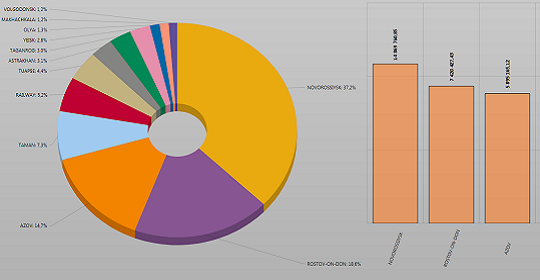The corresponding agreement was signed within the framework of the St. Petersburg International Economic Forum.
The agreement was signed between Rosselkhozbank and United Grain Company (UGC).
Both companies are significant players in the grain market:
Rosselkhozbank — one of the fundamental banks in the national credit and financial system, serving the agro-industrial complex of Russia
OZK Group is the only state-owned infrastructure company on the Russian agricultural market.
In addition to the function of a trade and logistics operator in the market, selling Russian grain for export, the company also carries out trade and procurement activities in the domestic market as part of the national trade security program.
According to the signed agreements, a new product will appear on the market — a non-deliverable forward contract.
Russian grain exporters will be interested in such a product, because it will allow them to hedge the asset price, that is, their export earnings.
A market participant fixes an acceptable price for an asset at the time of contract execution, thereby minimizing the risk of adverse changes. If the price changes materially, the loss will be compensated for by the difference paid by the forwarding counterparty.
It is planned that such contracts will be concluded through the National Commodity Exchange, which is part of the Moscow Exchange Group.
Rosselkhozbank and OZK will also support the creation of a market benchmark for wheat prices in the country, which should make the market more transparent for participants.
At the end of last year, grain has become one of the key export items of the Russian agro-industrial complex.
Shipments are up 28% to $ 10.2 billion. And yet everyone understands that the market itself is very volatile.
The introduction of such an instrument as a non-deliverable forward contract should just be able to hedge price risks.
This, in turn, will allow the industry as a whole to maintain financial stability, jobs and strengthen the competitiveness of Russian exporters in world markets.

In world practice, forward contracts in grain markets have been used for a long time.
And the Moscow Exchange is not the first attempt to launch exchange grain trading.
The first bidding for the deliverable forward agreement was held in December 2015.
This undertaking was not successful, in particular, due to the fact that all deliveries were made through accredited elevators of the Voronezh region, where it did not make sense for large producers to transport grain due to their existing warehouse space, and for smaller sellers, transportation increased the expenditure side.
And the subsequent large thefts at elevators, among other things, led to the termination of trading.
Delivery forward contracts in the OTC market also have their «disadvantages»: in particular, in Ukraine there were multiple defaults on forwards for the delivery of the 2020 crop. And some of the unscrupulous market participants, taking advantage of the rapidly growing world prices, disrupted the execution of contracts.
The mechanism for passing contracts through the exchange, which will be the guarantor of the transaction, should minimize the risks of participants.
A non-deliverable forward is an opportunity for agricultural producers, sellers and traders of grain to insure themselves against price fluctuations.

